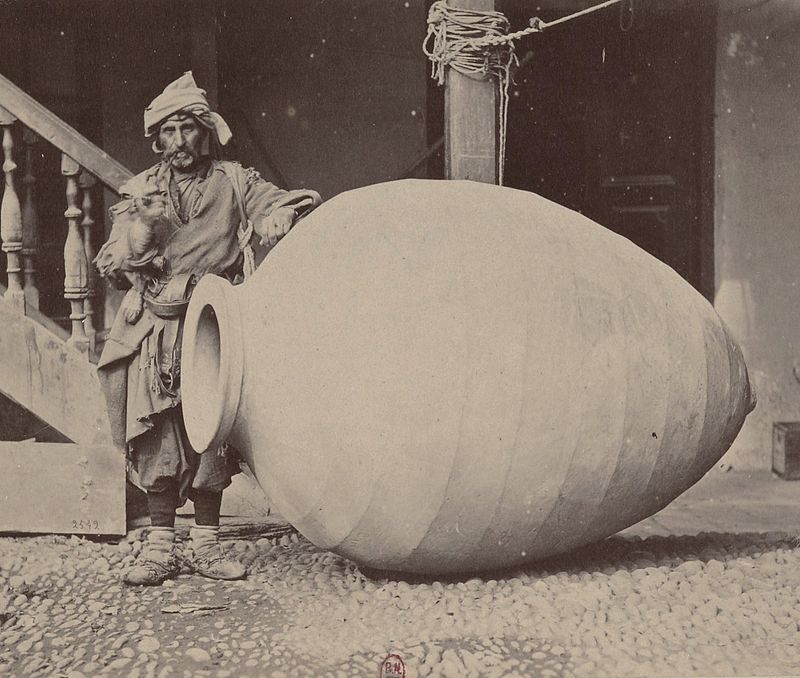nordmann
Nobiles Barbariæ

Posts : 7223
Join date : 2011-12-25
 |  Subject: The value of researching Danish intoxication Subject: The value of researching Danish intoxication  Mon 19 May 2014, 09:20 Mon 19 May 2014, 09:20 | |
| Some recent finds in Denmark (Nielsen will be chuffed with this) have thrown new light on the ancient relationship between Nordic people and the rest of Europe in pre-Viking times, and indeed on Nordic drunkenness through the ages. In fact one of the finds in Kostræde, a small town south west of Copenhagen, is of huge importance indeed. The pit hoard (dated to between 1100 and 500 BCE) contained amongst other things a bronze strainer (the oldest such artefact yet discovered in the region), the perforations of which when chemically analysed revealed residue of wine made from grapes. The importance of this find resides in the fact that this pre-Iron Age community, based on this evidence, was presumably trading with southern lands, grapes not being cultivable in Danish climes at the time. Further finds from later dates have corroborated this presumption and indeed the likely origin of the wine, southern France. However this evidence of wine consumption is by no means an indication of when Nordic people developed a taste for the hard stuff. Older finds, and again Denmark leads the field with a burial of a warrior prince found in Nandrup which has been dated to around 1300 BCE, reveal a much older relationship with the crapulent arts. A jar unearthed with the warrior held the residue of a distinctive Nordic grog, one remarkably similar in composition to a potent alcohol still enjoyed in Gotland, southern Sweden, made from barley, honey, juniper, and other herbs. Similar finds have been found in many graves covering a 150 mile radius of Nandrup. While some Danish archaeologists are reticent in drawing too firm conclusions from this research the momentum is definitely favouring those who propose that we seriously re-evaluate our earlier assessment of both the sophistication of this society and the extent of its integration with the rest of Europe. Ancient Roman and Greek texts, which had always hinted at a once vibrant economic interchange with the people of "Thule Proxima", are being re-examined in the light of these finds. Perhaps most sensationally there are increasingly conclusions being drawn regarding the actual effect of Roman expansion in the late Iron Age. Rather than "pacifying" and "civilising" Europe there is growing evidence suggesting that the Romans actually inadvertently disrupted and ultimately destroyed a complex and sophisticated network of nations, leaving us today with an image of these people as barbarians which frankly fits the archaeological evidence less and less with each new find. Terry Jones would be delighted. And if the Danes and Swedes hadn't so revered the hootch that they buried it we might never have been the wiser. I for one will raise my glass to them!  Roman wine drinking paraphernalia unearthed in Gotland, Sweden from the first century CE, demonstrating what we now reckon was a healthy continuation of a long-standing trade rather than evidence of a Roman introduction of wine as once was believed. |
|
Vizzer
Censura

Posts : 1816
Join date : 2012-05-12
 |  Subject: Re: The value of researching Danish intoxication Subject: Re: The value of researching Danish intoxication  Sat 22 Jan 2022, 22:13 Sat 22 Jan 2022, 22:13 | |
| Persia was long held to be the original home of viniculture, with the Shiraz grape variety playing a romantic (if perhaps misleading) role in this popular view. In recent years, however, the discovery of wine residues in neighbouring Georgia has meant that the history of winemaking is now believed to be at least 500 years older than the previous 7,200 years recorded from sites in the Zagros mountains. Since independence, wine producers in Georgia have sought to expand their sales around the world. The promotion of the unique qvevri method of wine-production has been central in this. A qvevri is a very large, point-bottomed clay jar used for fermenting the grape juice. The point-bottom means that a qvevri is not self-supporting but rather is buried in the ground with only the rim exposed: 8000 Years of Winemaking in GeorgiaHow much of this is clever antiquarianism, by which this ancient technique has been revived rather than having survived as such, is open to debate. But there does seem to be evidence that it is indeed a technique which has survived down the ages.  (A man-sized qvevri from the 19th Century)  (Buried qvevri in a 21st Century Georgian winery) One wonders to what extent wine travelled across Europe in those thousands of years before the foundation of Rome. Quite far one would imagine. And for wines to travel from the Black Sea region to the Baltic, either by sea (via the Pillars of Heracles), or even directly (overland and by river) would not have been beyond the capabilities of pre-Roman technology. |
|
